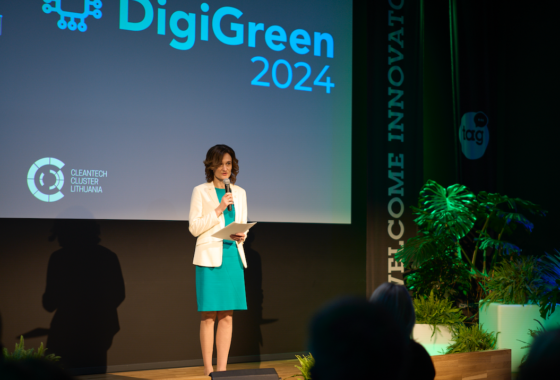DigiGreen is the premier conference dedicated to innovations in green and digital transformation across the Baltic states. This event, now in its third iteration, consistently draws experts, business leaders, and innovators committed to fostering a more sustainable and cleaner future. The conference serves as a pivotal forum for discussing the most pressing issues in sustainability, the dynamics of change, and the trends and developments in clean technologies, among other vital aspects of this sector.
The conference was inaugurated with welcoming remarks from the Speaker of the Seimas, Viktorija Čmilytė-Nielsen. In her address, she highlighted the significance of the Baltic region’s journey towards sustainability and technological advancement, noting a remarkable 70% increase in investments in Lithuania’s clean technology sector in recent years. This surge underscores robust investor confidence and the growing potential of the green economy. Further affirming these positive developments, Laima Balčiūnė, Director of Saulėtekis Tech Park, presented the 2023 Lithuanian cleantech report. This comprehensive document, detailing performance indicators and data for the sector’s leading companies, is already available here: https://issuu.com/sunrisetechpark/docs/cleantech_review
DigiGreen panel discussions – from sustainability dynamics to economic aspects
The event convened over 30 speakers, who are sustainability enthusiasts and experts from across the Baltic countries, alongside a broader assembly of attendees. The speakers represented notable companies such as Solitek, Teltonika, and Ovoko, engaging in substantive discussions with peers and policy makers.
The conference agenda covered pivotal topics in clean technology, including the dynamics and synergy of sustainability, trends in clean transitions, the significance of mobility in technology shifts, and evolving needs for talent. Discussions extended to the empowerment of sustainable e-platforms, green finance, the application of engineering enzymes to combat polyester pollution, and biotechnological innovations aimed at fostering a greener future. Furthermore, the contributions of universities and the academic sector to clean technology advancements were examined, along with the role of private funding in driving sustainability innovations.
